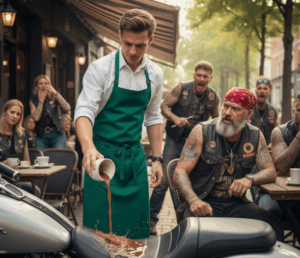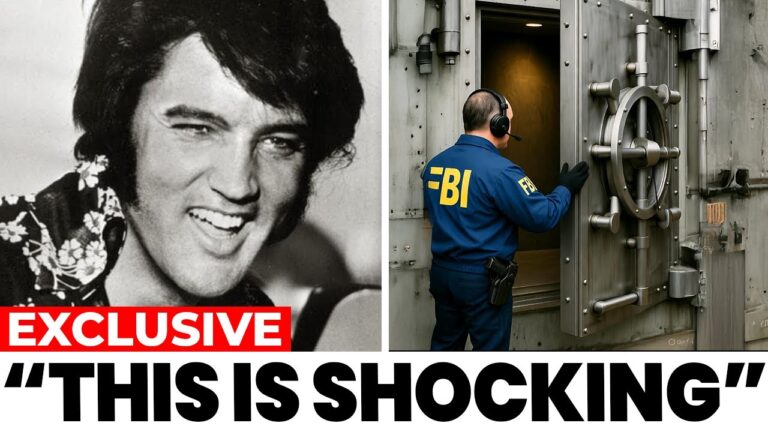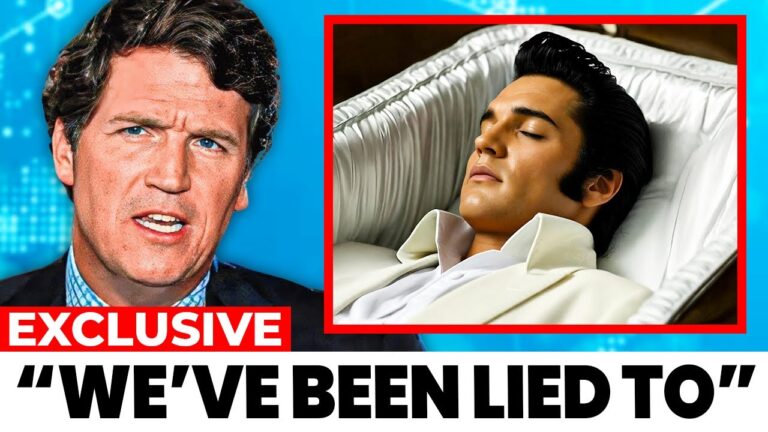Morning, and the city was still half-asleep. A small sidewalk café sat under the shade of a tree, with old wooden tables and chipped plastic chairs. The smell of roasted coffee blended with the damp air, mixed with the lingering scent of exhaust fumes from rush hour.

Six Harley-Davidsons were parked in a row by the curb, gleaming black and heavy like a pack of beasts resting after a long ride. Passersby glanced quickly, then hurried their steps.
We – a bunch of old bikers – sat around the center table. Hair streaked with gray, leather jackets worn at the shoulders, tattooed arms, faces carved by time. Our hoarse laughter floated between cigarette smoke and thick coffee. Outsiders only saw a pack of wolves, but in truth, we were simply savoring a rare moment of peace.
The other customers were quieter than usual. There were cautious glances, whispers barely audible. This city had grown used to looking at bikers with fear and prejudice.
A young waiter, thin and wiry, carried a tray of coffee from the counter. His eyes flicked across our table, full of disdain.
As he set the cups down, he tilted the tray on purpose. A stream of dark coffee spilled onto the seat of one Harley parked nearby, leaving a brown stain across the polished chrome.
The café gasped. Everyone braced for chairs to topple, curses to erupt.
I set my cup down, wiped the splash from my sleeve. The group stayed silent. The boy smirked, eyes gleaming with challenge.
In his gaze, I saw it clearly: hatred nurtured long before this moment. To him, we were nothing but useless old men, noisy machines, constant trouble.
The air grew thick. Someone whispered:
– “This is gonna end bad…”
The boy wiped the table, his voice sharp, pushing the tension higher:
– “I know your kind. Tattoos up your arms, faces always scowling. Bikes so loud the whole street can’t sleep. What’s respectable about scaring people just by showing up?”
The café froze. Every eye locked on us, waiting for an explosion.
But unexpectedly, a woman’s trembling voice broke the silence.
From the corner, a middle-aged woman stood. She placed her cup gently on the table and stepped closer:
– “You’re wrong, son. Six months ago, these men drove me to the hospital in the middle of the night. I was in labor, no time to call a taxi. They carried me straight into the emergency room. If not, my boy wouldn’t be alive today.”
Her words landed heavy.
At another table, an old man raised his voice:
– “Two years ago, my grandson had leukemia. We had no money left. It was this very group who raised funds, gathering every dollar to help with treatment. Today, the boy is alive, healthy, back in school.”
The atmosphere shifted. Murmurs rippled, shame mixing with disbelief.
The young waiter’s face flushed. He stumbled back a step. He turned, ready to walk away, when a figure stopped him.
Our leader – a man with graying hair, face stern as stone – bent down to meet his eyes. His stare was sharp, but his voice warm, startlingly so:
– “Son… don’t judge people just by what you see. Don’t let tattoos or exhaust noise blind you from the truth. Everyone carries scars, but what matters is what you do with them. We may be loud, rough around the edges… but we’ll never turn our backs on someone in need.”
His words weren’t loud, yet they shook the café.
The boy dropped his gaze. Around him, customers nodded silently, their looks no longer hostile but changed.
We didn’t stay long. We finished the lukewarm coffee, stood, and left the table. Before walking out, I placed a few bills on the tray.
– “For cleaning up. And as a reminder: never judge before you truly know.”
Outside, the sun had risen high. We climbed onto our bikes, engines rumbling. Exhaust smoke curled upward, light bouncing off the chrome.
In the rearview mirror, I saw the boy still standing there. His eyes no longer burned with hate but with quiet reflection. Maybe he had just learned a lesson no classroom could teach: that truth sometimes hides behind the dusty veil of prejudice.
Engines roared as six bikes rolled out of the street. Smoke swirled, hiding the stares still following us from the café.
One brother called out over the wind:
– “Maybe… a lot of people really do hate us. Just for our tattoos, our bikes, and the way we look.”
Another chuckled, voice rough:
– “Yeah, maybe they do. But we don’t live to please anyone. At least we know we’ve done the right thing.”
A third voice joined in, firm:
– “Exactly. It’s not our job to prove ourselves to the world. Our job is to make life a little less cruel—at least for the ones we can help.”
Laughter rumbled beneath the engines. Weathered faces, eyes seasoned by the road, shared an unspoken agreement.
I glanced into the mirror. The city shrank behind us. Ahead, the open road stretched endless.
We carried on.
No need for approval, no need for sympathy.
Only this: somewhere out there, someone would remember that behind the smoke and the roar, there were old bikers quietly sowing a little kindness on the road of life.





